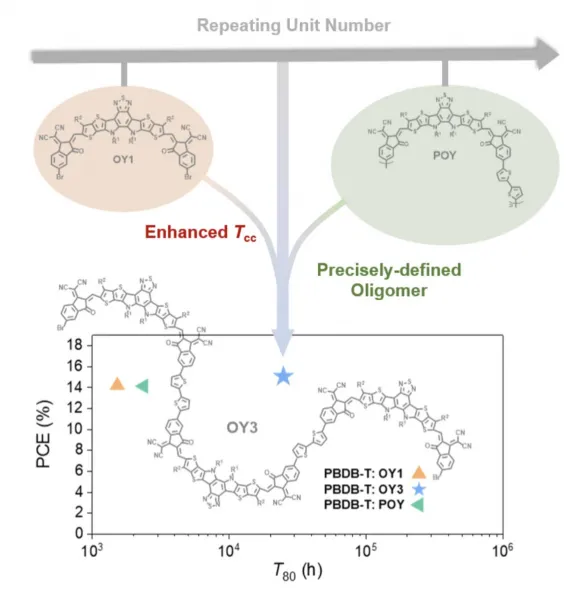Stable and efficient organic solar cells based upon oligomer acceptors
- Organic solar cells are solar technologies with light-absorbing layers made from conductive organic polymers or organic molecules. These solar power solutions can have remarkable advantages over their non-organic counterparts, including lighter weight, a bigger area insurance coverage and lower construction costs.

Some organic solar cells created over the past few years achieved encouraging power conversion effectiveness of over 19%. Nonetheless, producing organic cells that are efficient but also stable in their long-term operation has shown to be highly tough.
Scientists at South China University of Technology and Friedrich-Alexander-Universität Erlangen-Nürnberg have actually recently developed new organic solar cells with a good power conversion performance and enhanced stability. These cells, introduced in a paper in Nature Energy, are defined by a transformed molecular chain length, achieved using a series of oligomer acceptors (i.e., molecules composed of numerous linked atoms that can bind to electrons).
" Several works have actually shown that Y-series polymer acceptors can sustain the outstanding photovoltaic or pv efficiency of their precursor small molecular acceptors (SMAs), and all-polymer solar cells have fantastic benefits in morphology stability compared to SMAs, which reveals excellent possible for their practical applications," Ning Li, one of the researchers who performed the study, informed TechXplore. "Nevertheless, these type of Y-series polymer acceptors have unsure molecular weight and are entraped by batch-to-batch differences."
To get over the limitations of formerly reported Y-series polymer acceptors, Li and his colleagues prepared an alternative series of acceptors based upon oligomers, a class of polymers with molecules including reasonably few duplicating units of atoms or teams of atoms. Consequently, they conducted experiments evaluating their effectiveness, while likewise exploring the molecular weight-function partnership and residential property transition from SMAs to polymer acceptors.
In these experiments, an organic solar cell based upon an oligomer acceptor prepared by the researchers achieved power conversion performances above 15% and an extrapolated T80 life time over 25,000 h. These values validate the guarantee of the team's strategy for developing organic cells that are both stable and efficient.
" The oligomer acceptor we created not just inherits the appropriate crystallinity from SMA, but likewise provides comparable thermal stability to polymer acceptors, contributing to the advancement of solar cells that incorporate a high performance with a lengthy life time," Li explained. "Overall, the oligomeric technique we proposed could aid to resolve the conundrum of constructing stable and efficient OSCs and provides ingenious insight into molecular design."
In the future, the new organic solar cell design presented by this team of researchers might pave the way towards the advancement of organic solar cell technologies that can be successfully carried out on a large-scale. Li and his colleagues will certainly currently continue servicing their design to achieve better effectiveness and stabilities.
" We are currently planning to additional maximize the molecular design of oligomer acceptors, so we can enhance the effectiveness and stability of OSCs all at once," Li added. "We would also such as to decrease the cost of preparing oligomer acceptors to meet the commands for industrial manufacturing."
Also read
- UbiQD Secures Landmark Quantum Dot Deal with First Solar
- Astronergy Invests $53M in Tandem Solar Cell Project
- ARENA Unveils $39M Solar Innovation Funding Round
- CNNP Optoelectronics brings utility-scale perovskite modules out of the lab
- Low-Temperature Sequential Deposition Lifts Inverted Perovskite Solar Cells Efficiency Record
